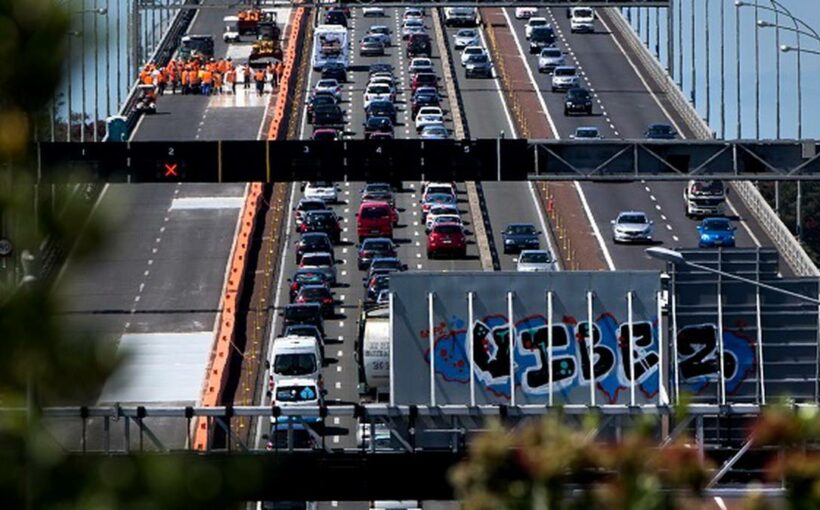Chief executives rate a second harbour crossing in Auckland as the most important priority among a suite of future infrastructure projects.
They rated it at an average 6.82/10 on a scale of 1-10 where one equals not important and 10 equals extremely important.
But CEOs from companies whose business is dependent on reliable transport across the city rated the importance of a second crossing — preferably a tunnel — even higher.
Finance Minister Grant Robertson said last month that $50 million had been put aside to fund a business case on a second harbour crossing.
The estimated $10 billion project is not scheduled to begin until the 2030s.
But an accident on the bridge last year, which resulted in several lanes being closed for a prolonged period, has highlighted the necessity for an alternative crossing.
It was back to the drawing board for project planners earlier this year, when construction costs escalated for the Government’s flagship infrastructure programme, as a result of Covid.
In June, Grant Robertson announced over two-thirds of the projects would proceed with the Government increasing its investment in the New Zealand Upgrade Programme (NZUP) to support New Zealand’s economic recovery.
“Fully funding the new estimated costs for every project would have cost up to $6b extra on top of the original $6.8b.
“So instead we’ve taken a balanced approach with a mix of additional investment and a handful of projects being re-scoped while also keeping a lid on debt.”
The Government last year announced it would fund 150 “shovel-ready” projects worth some $2.6b to boost activity during the pandemic.
But just 44 per cent of the 150 projects were under construction by February.
CEOs were scornful: “Shovel-ready — has been a disgrace” — was a common refrain.
“The shovel-ready projects are important as they are costing a lot of the country’s treasure,” said a utilities firm boss. “However there is no evidence as to whether they are the right ones to do and there seems to be a general lack of economic rigor and analysis around them.
Said Accordant’s Simon Bennett: “The shovel-ready is important but has not been executed.”
“If we had shovel-ready (typically funded to date by private equity) projects — these could alleviate our social benefit funding and give dignity back to unemployed,” said an educator.
The controversial “Three Waters” reform proposal by the Government, based on advice from the Water Industry Commission for Scotland (WICS), promises to deliver sustainable outcomes by replacing local government ownership and management with four regional entities.
Councils are concerned that local accountability and control of key assets will be lost.
“The Three Waters project being centralised is just downright stupid,” said Mainfreight CEO Don Braid. “Water is used and looked after differently in the regions.
“Losing the skills and knowledge from the regions will be a disaster.”
“Three Waters is a waste of time unless settings are changed to facilitate private sector involvement,” added an investment banker.
CEOs gave the proposed $785mcycling and walking bridge in Auckland the thumbs down.
Last Friday, the Government quashed plans for the bridge just months after unveiling it.
The project had been widely criticised, even by cycling advocates, many of whom considered it an over-expensive means of providing cycle and walking links across the Waitematā Harbour.
“I would happily reallocate some the Auckland Harbour Bridge Cycleway fiasco costs to fix the existing bridge and add a second bridge for our Ashburton colleagues; to rebuild Marlborough and West Coast infrastructure after their floods; and put the deposit down on the new harbour tunnel,” said the LGFA’s Craig Stobo.
A banking CEO suggested Auckland needs a second harbour crossing that allows for cycling and walking rather than a dedicated bridge.
Local Government performance
The Herald survey also asked respondents to comment on how well their local council has performed in facilitating growth and development.
The weighted average score was just 2.28/5.
Auckland Council’s ratings were variable. “Sadly, the Auckland Council struggles for relevance here”, ” Auckland Council and its operating entities perform poorly”, and “Auckland is dysfunctional” were typical comments.
Said a banker: “Auckland Council, through its CCO Auckland Transport, seems intent on creating congestion in the CBD and totally uninterested in doing anything to ease congestion on major highways.
Wellington City Council’s rating was negative. “Very Green. Won’t promote road transport or infrastructure and is leading to a strangulation of Wellington, while vanity projects around bicycle transport and conference centers take priority away from providing basic infrastructure like sewerage and a library” said a utility CEO.
Some respondents suggested that councils weren’t really set up to facilitate growth arguing that new models like GST sharing should be considered.
Accordant’s Simon Bennett underscored this: “They have few tools and little capability but that does not mean that localism does not have potential.”
Source: Read Full Article
